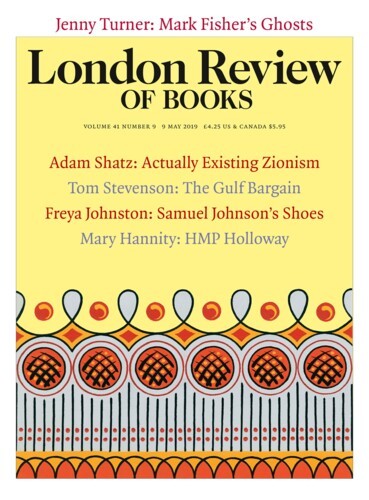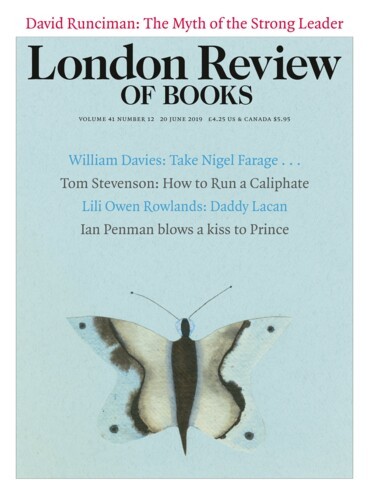The reporter Marie Colvin was killed in Homs in February 2012. A Private War, Matthew Heineman’s movie based on her life, begins with archival footage of Colvin being asked by an interviewer what she would want a young journalist to know about being a war correspondent. Her answer comes in two parts: first, that you should care enough to write in a way that makes others care; second, some tough-sounding advice on not acknowledging fear until the job is done.
Tom Stevenson
Tom Stevenson is a contributing editor at the LRB. His collection of essays, Someone Else’s Empire: British Illusions and American Hegemony, many of which first appeared in the paper, was published in 2023.
On 15 April, President Trump made an unexpected phone call to Khalifa Haftar, a Libyan military officer and former CIA asset who has launched an attack on Tripoli with the aim of overthrowing Libya’s nominal ruling authority, the UN-backed Government of National Accord. According to a White House statement, Trump ‘recognised Field Marshal Haftar’s significant role in fighting terrorism and securing Libya’s oil resources’, and the two men discussed their ‘shared vision for Libya’s transition’.
What are we there for? The Gulf Bargain
Tom Stevenson, 9 May 2019
Anglo-American interest in the enormous hydrocarbon reserves of the Persian Gulf does not derive from a need to fuel Western consumption. Britain used to import considerable quantities of Saudi oil, but currently gets most of what it needs from the North Sea and hasn’t imported much from the Gulf since the 1980s; Saudi oil currently represents around 3 per cent of UK imports. The US has never imported more than a token amount from the Gulf and for much of the postwar period has been a net oil exporter. Anglo-American involvement in the Middle East has always been principally about the strategic advantage gained from controlling Persian Gulf hydrocarbons, not Western oil needs.
Egypt’s former president Mohamed Morsi collapsed and died yesterday in the glass-enclosed dock of a jailhouse courtroom. No images have been published of his final moments: the authorities confiscated the cameras of everyone present. Morsi had spent years in the Scorpion wing of Cairo’s Tora prison, often in solitary confinement. He was denied medical treatment for long-term illnesses. His family say he was subject to a programme of medical negligence. They have not yet seen his body. Amnesty International and Human Rights Watch have called for an investigation but there is no chance of that.
How to Run a Caliphate
Tom Stevenson, 20 June 2019
The horrors of IS rule are well known: the killings of Shia; the choice offered to the Christians of Mosul (conversion, ruinous taxation or expulsion); the slaughter of polytheists; the revival of slavery; the massacre of Yazidis on Mount Sinjar. Less well known are the thousands of mundane regulations instituted by the caliphal bureaucracy. The claim to be a state, not just another band of zealous militiamen, was central to what IS stood for. In support of its statehood it operated marriage offices, a telecommunications agency, a department of minerals and a central birth registry. Its department of alms and social solidarity redistributed wealth to the poor. Its department of health brought in sanitation regulations that stipulated more frequent bin collections than in New York.
Podcasts & Videos
Weapons of War
Tom Stevenson and Thomas Jones
Tom Stevenson talks to Thomas Jones about the situation in Ukraine, the effectiveness of some of the weapons in use, from anti-tank missiles to economic sanctions, and the risk of nuclear escalation.
Read anywhere with the London Review of Books app, available now from the App Store for Apple devices, Google Play for Android devices and Amazon for your Kindle Fire.
Sign up to our newsletter
For highlights from the latest issue, our archive and the blog, as well as news, events and exclusive promotions.



